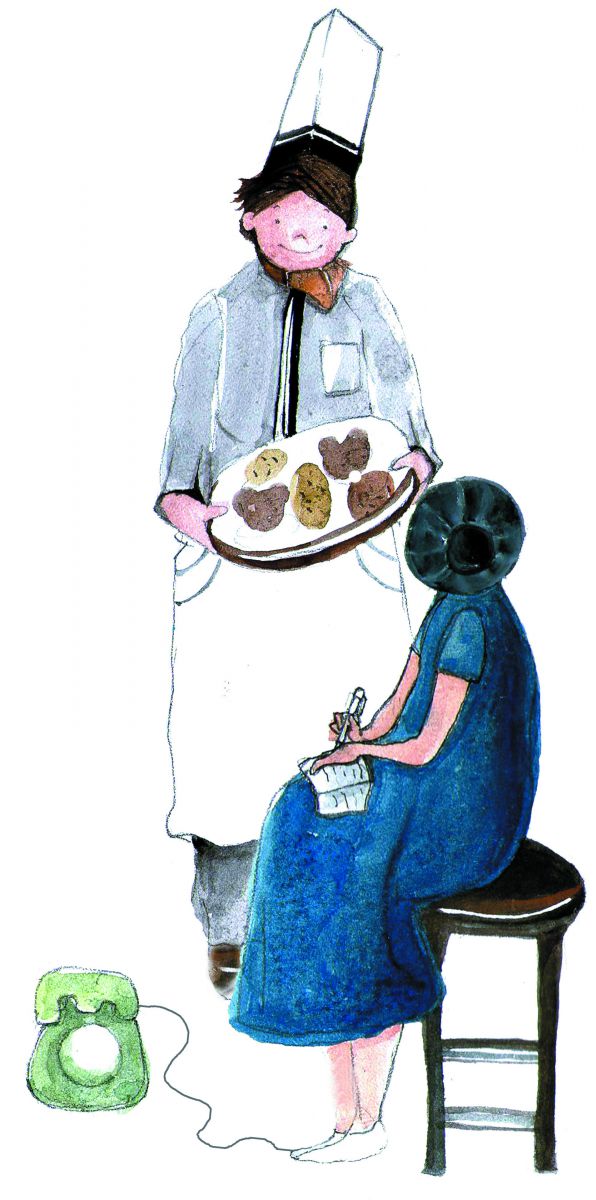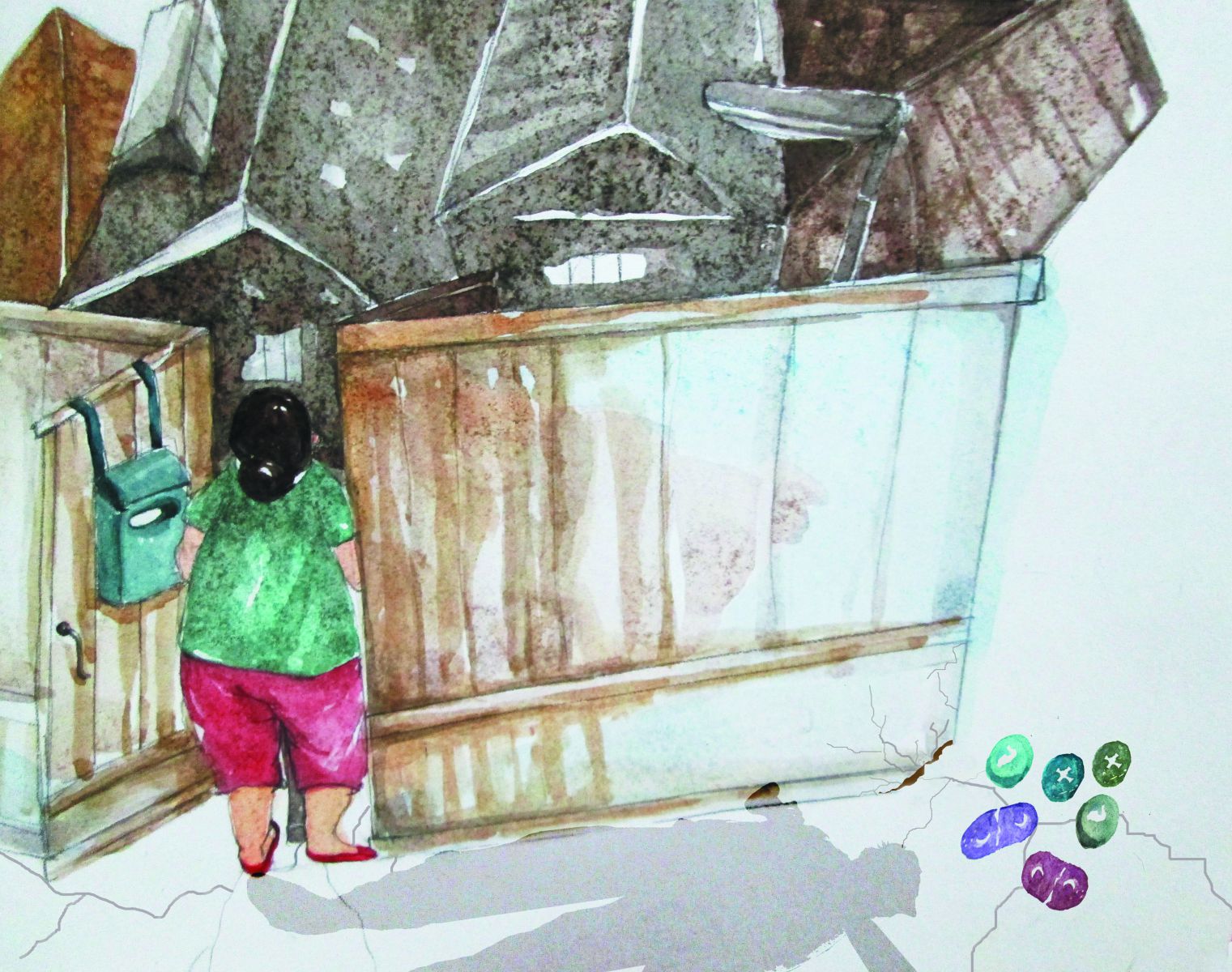

| From a Drug Addict’s Family Member |
| By Wu Yu Translated by Tang Yau-yang Paintings by Liu Jia-wen |
“All I do is take drugs. I don’t commit any atrocious crimes like manslaughter or arson. My actions don’t hurt others. It isn’t so bad, is it?” This is the way that many drug addicts rationalize their behavior to lend legitimacy to their deeds. It is true that they hurt themselves most of all, but they hurt others as well whether they intend to or not. My brother-in-law is one such heart-rending example. My nephew was born about 18 years ago. He was a sickly baby. His heart was damaged, and his stomach and intestines were incompletely formed. He slept day and night, waking only to feed. His body was limp and he couldn’t even cry very loud. When he was two, he contracted blood cancer and underwent chemotherapy for a year. The boy’s doctors concluded that his problems resulted from his parents’ drug abuse. The baby’s father is my husband’s younger brother. This brother-in-law of mine was always a problem for his parents, but the situation worsened when he became addicted to drugs. He would often stay out all night. Worried about him, my mother-in-law would stay up waiting for him, and she even went everywhere looking for him. He befriended a girl who was still in her teens. She had run away from home and often spent her time in video arcades. Like my brother-in-law, she had become addicted to drugs. When she was 18, they had a baby boy. This would be a joyous occasion in most families, but my parents-in-law hardly had a moment of joy from their newborn grandson. Health problems and mental disabilities plagued him from the moment he was born. My brother-in-law was later sentenced to 20 years in prison for using and selling drugs, and the baby’s mother left not long after giving birth to him. My parents-in-law suddenly had a baby on their hands. Even their combined 150 years on earth had not adequately prepared them to take good care of such a challenging baby. The old couple ferried him to and from the hospital, day in and day out. I couldn’t bear to see this, so I decided to take over and raise my nephew. The upbringing of a healthy child is daunting enough; the presence of a disability makes it much, much harder. But the occurrence of multiple disabilities, such as those my nephew had, rendered the responsibility all but insurmountable. I could not help but wonder about the cost of drug addiction—to myself, to my family, and to society as a whole.
Anti-drug volunteer Drug users in Taiwan are starting at younger and younger ages. Criminal groups have now extended their tentacles onto campuses. Drug dealing in schools, once the purview of solo practitioners or small-time groups, has become a well-organized gang activity. Every time I see a young soul overtaken by drugs, I see and hear a heartbroken mother weeping desperately over the loss—for all intents and purposes—of this child. Drug addicts need all the support that they can get to even have a chance of quitting the habit. Their family members are often willing to give unconditional support to help their loved one return to the right path, but often even their unlimited love and resolve can be worn thin by repeated offenses and broken promises. Family members themselves need support. I know how hard it is to be a family member, so I have become an anti-drug volunteer. I sometimes telephone addicts’ homes to offer help, but such gestures of support are often met with rejection. Many people do not want others to know about the drug addict in their homes. They’d simply keep their dirty laundry private, just as my mother-in-law used to do years ago with her son. In the face of such rejection, with which I can empathize, I share with them the story of my brother-in-law and his struggling son. I speak to them as one of them. As a result, many of them end up confiding in me their sorrows and struggles. We cheer each other up and we urge each other to stay the course in the fight against drugs, as victims or volunteers. Never too late I run a bakery. I once hired a young baker and asked him to start the next morning. He showed up on time at 8:00 the next day but was habitually late after that. I called him every day to remind him to come to work. I also talked to his mother and encouraged her to keep a motherly eye on him. The daily calls went on for more than a month. Then, unexpectedly, he started coming to work on time without being called. He has been a normal employee ever since. One day, after he had started a new batch of dough in the oven, he shared with me some thoughts. “I gave you a lot of hassle when I first started, but you kept calling me every day. To be honest, I’d just gotten out of jail at that time. I’d been put behind bars for drug use. I was still struggling with drugs. However, my mom’s getting old, and I didn’t want to trouble her with my addiction. Luckily you called me every day and Mom encouraged me. The two of you helped me restore my confidence in myself.” “If you’d known about my drug history and imprisonment, would you still have hired me?” he asked. “I would,” I said firmly. “When I was released from prison, I wanted to renounce my past evils [and start an upright life],” he said. “Fortunately, you put up with me and encouraged me, and you allowed me to evolve my life according to my own plans.” I often shared with him the stories of my brother-in-law and my nephew. The young man has worked hard at my bakery and learned new skills, he stopped seeing his drug friends, and he’s made monthly donations to charities as a token of his determination to do good. His return to righteousness has thrilled his mother. The sight of his family, now in the process of healing, deeply touches me. Love and accommodation do sometimes return a wanderer to the right path, so it is never too late to try to put things right.
An incomplete life My nephew is now 18 years old. Those long 18 years have been a great challenge to our patience and love. Afflicted with both mental and physical handicaps, he has undergone a lot of painful treatment and physiotherapy. He has fought bravely along the way, perhaps feeling the love from us. Yet even to this day, he can’t talk or take care of his own daily needs. The reckless drug abuse by his parents has left this boy in perpetual suffering. He will probably never cease to suffer for as long as he lives. Sadly, our entire family is suffering right along with him. Will this real-life lesson of our family serve to warn just one tempted person not to use drugs? Parents beware. Observe your children, and know what they’re up to. Get involved with their lives. Intervene at the first sign of trouble, and seek out help from government or private groups. Do so before it’s too late. |
















|


